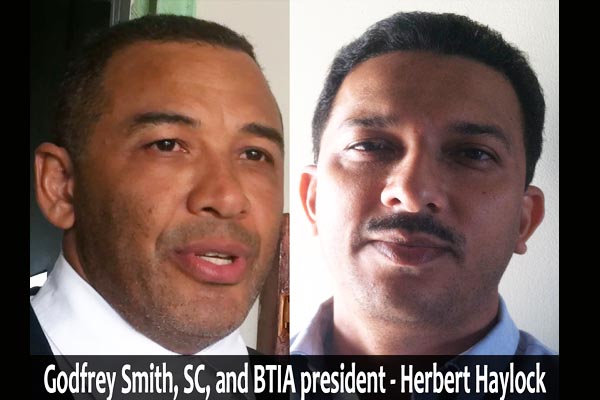The Belize Tourism Industry Association (BTIA) had a partial victory in court this evening, in its bid to challenge the US$50 million cruise port development being undertaken in Southern Belize by Norwegian Cruise Line, after Supreme Court Justice Courtney Abel ruled that he would accept an application from the BTIA to have the court probe into the processes which led to the approval of the company’s Environmental Impact Assessment (EIA) in March this year.
Of note, though, is that there is no injunction barring the investor from proceeding with developments on the ground. The BTIA has so far not asked the court to issue an order to stop the project, and Senior Counsel Eamon Courtenay, the attorney for the interested party in the case – Belize Island Holdings Limited, the local subsidiary of Norwegian Cruise Line, told the media this evening that he does not think that the BTIA is really serious about stopping the project.
“If at all there is a serious intention to stop this project, the day has long gone where a serious person who wants to stop a project should have applied for an injunction. We would argue very, very vigorously that that day has long past and they are not entitled as a matter of equity to stop the project,” Courtenay told the press.
BTIA’s attorney, Godfrey Smith, SC, told the media, though, that BTIA could still ask the court for an injunction.
“We will be here with full force and arms to deploy all the arguments to demolish that application,” Courtenay responded, adding that it is unlikely that the court would grant such an injunction.
Herbert Haylock, president of the BTIA, was the only person to swear an affidavit in these preliminary proceedings, which were intended to give the court an opportunity to review whether the BTIA has an arguable case with a reasonable prospect of success.
The BTIA is a national organization which represents over 360 individuals and organizations, with a total of 650-700 direct and indirect members, including hoteliers, operators, and tour guides. Haylock told us that the BTIA will discuss the court’s decision with its membership before deciding how to proceed on the points that the court would not accept for judicial review.
Haylock indicated that the BTIA remains concerned that their legitimate expectation that the Government would maintain its policy not to allow mass tourism in the south has been violated.
He told us, though, that he was pleased that the more important issue – getting leave for the court to review the processes leading to the approval of the EIA for the Norwegian project, has been granted.
“We are satisfied with that,” Haylock affirmed, adding that they will now be able to look beyond the court’s decision to decide what further actions they will take as an association.
Courtenay argued in court that the case of the BTIA against the Department of the Environment (DoE) and the National Environmental Appraisal Committee (NEAC) challenges the EIA and not the Environmental Compliance Plan (ECP), which he contends is a legally binding agreement between the developer and the Government of Belize, an agreement which Courtenay said could not be quashed by the court.
Courtenay told Abel the BTIA’s failure to challenge the ECP is “fatal to their case.” He said that this is “a knockout blow” to their case, because even if for the purposes of argument, one were to accept that there are irregularities, it would not result in the ECP being quashed, or declared unlawful or void. He said that as a result, “the approval of the project stands and the investment continues…”
Smith, on the other hand, after having won the court’s permission to file the judicial review challenge, told the media that their case is “obviously not fatally flawed, because the judge listened to the arguments and ruled there is an arguable case.”
Whereas Courtenay told the media that all the issues that the BTIA has with the EIA were properly addressed in the ECP, Smith said that it is wrong to suggest that the ECP is a cure all.
He insists that the EIA could be quashed, and in that event, it would mean that the ECP sits on something that does not exist. Smith told the court that if there can be no lawful EIA, there is no ECP and it would become unenforceable.
In its application filed in May, the BTIA sought the court’s permission to approve judicial review for a series of orders and reliefs, including a declaration that (1) NEAC’s decision not to hold a public hearing, as recommended by the BTIA, was unreasonable, unlawful and void; (2) the BTIA had a legitimate expectation created by the National Sustainable Tourism Master Plan for Belize that mass tourism would not be allowed in Southern Belize; (3) the Department of the Environment’s decision to approve the EIA is unlawful, null and void, because the EIA does not meet the minimum requirements in law; and (4) NEAC’s decision to recommend that the DoE approves the project was made despite its failure to observe requirements for statutory publication and proper notice.
In granting the BTIA permission to file its formal claim for judicial review of the Harvest Caye project today, Justice Abel made it clear that the BTIA had only established that it has an arguable case with a reasonable prospect of success on the last two points – which means that while the court has agreed to probe the processes by which the DoE and NEAC arrived at approving the Harvest Caye EIA, the question of the Government’s decision not to hold a public hearing and to deviate from the policy in the tourism master plan will not form a part of the subsequent court proceedings.
Smith told the press that the next step is for them to file more papers to bring the claim for judicial review before the court.

